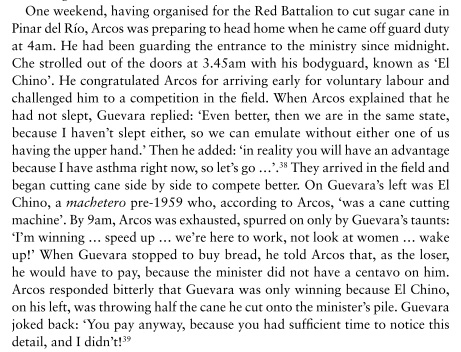|
Quotes from Helen Yaffe: Che Guevara - The Economics of Revolution
Che invited Salvador Vilaseca (a professor of Mathematics at Havana University, who taught Che higher mathematics) to work as a bank administrator. Vilaseca was afraid of the task, knowing nothing about banks and he told this to Che, but he replied: Me neither and I am the president, but when the Revolution assigns you to a post, the only thing to do is to accept, get studying and work to perform as you should."
"Because my talk has been much more fiery than you would expect for the post I occupy; I ask once more for forgiveness, but I am still much more of a guerrilla than president of the National Bank."
"A socialist economy without communist moral values does not interest me. We fight poverty, but we also fight alienation."
"So you would like us to turn Cuba into a sort of seminar for intellectuals, a Parisian cafe where people can sit down and rave about the latest literary hits. But what kind of country do you think ours really it? Cuba is in the midst of a revolution, besieged by US marines; she must see to her defences and build her future. It is not for fun that we have decided to rush our children from secondary schools to high schools and from high schools to universities. It is because we have to act quickly and because we have no choice in that matter... In very quick succession, we have been taught the meaning of economic blockade, subversion, sabotage and psychological warfare."
When Che Guevara was faced with a problem about salaries, he once said:
"We are to blame and that must be said honestly. What will happen? The working class wants to condemn us for this? Man, let them condemn us, let them change us, let them shoot us, let them do anything. But the problem is still here."
"Made in the USA - the function of a rifle is to kill. In the hands of Batista's troops, a US rifle is a weapon in the service of exploitation. But in the hands of the Revolutionaries, that rifle is an instrument of liberation."
"Believe in man, but control him."
Che's reply when the director of the EC of Textiles asked for his opinion of a new print design for women's clothes:
"Do you believe that I should be in charge of deciding how the women of this country should dress? I refuse to give my opinion about this design. It is up to the specialists and designers to decide this issue. The worst thing that could happen to the women in Cuba is that a minister decides what clothes they wear. If I say that I like the colour red, does that mean that all the women should go around dressed in red?"
"You cannot change how people think by decree. People have to change their way of thinking by their own conviction and the best way to change their way of thinking is to demonstrate the capacity for sacrifice of the true revolutionaries, the capacity to help a compañero, the capacity to do to concrete things for the collective and for the individual, to show that members of a revolutionary organisation have not acquired any types of extra rights, what they have acquired are duties that they have to fulfil."
"The Revolution has to be made at a furious pace, those who tire have the right to be tired, but they do not have the right to be in the vanguard. Therefore we need to go to the factories, to converse with everyone there, investigate the problems there are, promote free, open discussions, without any form of coercion... to collect all criticisms with honesty."
"To the workers who make machines, to the workers who invent formulas, to the workers who are concerned for the rationalisation of work which is even harder than inventing a machine; to these people we must give the opportunity to become a director."
" We are entering the era of automation and electronics. We have to think of electronics as a function of socialism and the transition to communism... Today and tomorrow cadre must be prepared so they are ready in the future to take up the next great technological tasks and for the automation of an ever-increasing part of total production, the liberation of man by means of the machine."
"This form of education [studying hard during the school year, then devoting vacations to agricultural work] best suits a youth that is being educated for communism: the form of education in which work loses the category of obsession that it has in the capitalist world and becomes a pleasant social duty, carried out with joy, carried out with revolutionary songs, amid the most fraternal camaraderie, by means of mutually invigorating and uplifting human contact."



|

